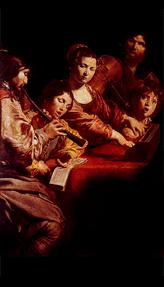 |
 |
 |
 |
 |
|
Over the years, there have been only a handful of "sax 'n' strings" recordings that have entered into the pantheon of jazz classics. The old Verve recording of Charlie Parker with strings is surely one of them, as is Art Pepper's Winter Moon and Stan Getz' idiosyncratic Focus (with Getz improvising in real time over spiky abstract pieces composed by Eddie Sauter). Most of the rest tend to fall into the broad amorphous category of "mood music," either because of the saxophone player's
imaginative limitations, or because of the generic nature of the string arrangements - or both. But this new recording by John Surman can confidently take its place within the company of Parker, Adams and Getz. On Coruscating, Surman both writes for -- and plays with -- a string quartet, and he also involves bassist Chris Laurence, who is a member of Surman's regular jazz quartet, as a fifth stringed instrument. Surman plays his usual combination of baritone and soprano saxes, plus bass and contrabass clarinets. The short opening piece, "At Dusk," has Surman improvising thoughtfully over moody, modal chords from the strings, evoking an "early music" atmosphere which is revisited later on "Winding Passages."
These pieces may suggest to some listeners Jan Garbarek's blockbuster collaboration a few years ago with the Hilliard Ensemble, the strings in this instance taking the place of the Ensemble's voices. But although there 's an emotional consistency to the CD, Surman avoids the kind of stylistic uniformity favored by someone like Garbarek, who tends to develop themes and run with them. So other tracks on Coruscating have a decidedly modern sound, and a piece such as "Stone Flower," for example, has such a strong melodic content that it could almost have been lifted from a Cole Porter or Irving Berlin songbook. At other times, Surman seems to adopt aspects of the modern classical vocabulary, especially in the second half of the program, introducing the occasional jagged rhythmic thrust, or some late romantic dissonance, or a touch of chromatic instability.
It's not as if Surman is flaunting his mastery of the string quartet medium and saying "OK, here's my Haydn tribute, and here's my Bartok tribute, etc., etc." But he's a skilled enough writer and arranger that he's not just falling back on some generic string quartet licks, and he also realizes, consciously or unconsciously, that he'll have a more
interesting result if he doesn't strive too hard for stylistic consistency. Considerable development takes place even within some pieces, such as "An Elusive Shadow," as Surman begins with avant gardish explorations of the contrabass clarinet's lower register, accompanied by quivering, agitated strings, and then evolves into a new and more conventional theme for the strings, and finally begins some serious improvising against the theme.
Some other pluses on this CD are, first of all, the prominent role occupied by Surman's bass player, who has a number of fine solos, playing double and triple time against the strings on "Dark Corners," and also serving as a third voice throughout the CD, echoing Surman's lines on some pieces and following the quartet on others. Surman also breaks out individual string voices from time to time, allowing a violin or viola, for example, to launch into a counterpoint theme and work again the prevailing grain of a piece. As for Surman himself, his own solos are never really overpowering, but rather weave nimbly in and out of the riffs and melody lines being played by the strings. Surman's horns rise to occasional climaxes and crescendos,
and his growly baritone can be delightfully expressive, but like the mature, confident musician he is, Surman is much more interested in the overall effect of the music than in making a bravura personal statement. He's already been there and done that. I've played this CD a lot over the past several weeks, and I can attest to its substantial staying power. Even after repeated spins, I find that I'm obtaining considerable pleasure from the twists and turns of the music, and the interplay of the musicians.
© bill tilland
|
|
|
|

